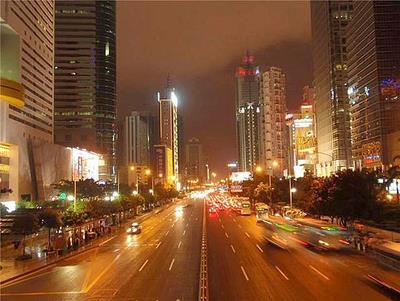
IN THIS Shenzhen expat story, we meet Ms. Star Morrison, a blues&jazz singer and event organizer.
NextInsight learns that this Canadian is effusive with praise about the opportunities that Shenzhen offers, and her account could almost be out of a 1950s feel-good flic telling of a young woman’s journey to New York or Hollywood to make it big in the entertainment biz.
However, she did put aside her famous Great White North knack for politeness and had a few suggestions for improving the service mentality in the city.
I had to wait until halftime of the simulcast doubleheaders to interview her, because the entire establishment was fixated on the possibility of defending champs Azzurri being knocked out of the World Cup in one of the biggest upsets in FIFA history, or seeing if the All Whites could surprise themselves into the knockout stages.
As a jazz singer and event organizer, Ms. Morrison, who hails from the north shore of Lake Erie, can hardly be considered shy and enjoys a good dose of publicity like anyone else.
Although a Canadian by birth, she has been in Shenzhen for nearly a year, and also spent a goodly stint in Schuylerville, New York following the Grateful Dead.
“I lived in Upstate New York back in the 90s so as to follow my favorite band around. Yup, I’m a Deadhead, but was onboard before Jerry (Garcia) passed in 1995. And living ‘abroad’ in the US also made it less drastic a move to head to China later on,“ she said.
“Consider it a dry run.”
|
A dedication to music runs deep in her background, and did much to inform the decision to become a jazz singer later in life.
“Following the Dead around was such a lifestyle thing, and didn’t at all seem out of the ordinary back then. So making the jump to traveling to Shenzhen was not really a big deal, at least in terms of building up the courage or motivation,” she said.
So what was it that first brought China onto her personal radar screen, and what prompted her to take the Asia Pacific plunge?
“I don’t really think it’s all that daring in this day and age to move shop to China, as a quick stroll around certain areas or establishments will reveal quite a few foreign faces. And don’t forget, Canadians of Chinese descent make up 5% of my country’s population and something like half of Richmond (a suburb of Vancouver), so if they got the guts to move across an ocean, so do I,” she said.
However, it wasn’t the music’s siren song that lured her to Cathay, but instead something far more practical and decidedly more garden variety.
“I first came here to teach English, as that is the easiest way to get grounded here. But I fully intended to get into the music scene as soon as I had made the right connections. This just further proves the lure of Shenzhen, and I am not sure if this is true all over China, or at least in some of the more developed metro areas,” she said.
And which phenomenon was that, I asked her.
“The fact that anything you want to do in Shenzhen is quite possible, as long as it’s legal, of course. You can truly follow your dreams here, as cliqued or corny as that might sound. But I have found it to be true.”
But didn’t some of these same opportunities exist back in Canada? And didn’t an inability to communicate in Mandarin Chinese, the lingua franca of nearly all 1.3 billion denizens of Ms. Morrison’s adopted country, present a serious hurdle to career advancement and success?
“Of course, there are times when I just want to jump into a time machine and leap a year into the future, after first programming the contraption to give me the accumulated knowledge of 12 months of intensive Chinese language study...

“But who has time for that?” she said with a wry smile.
As for the language barrier, she said that music was the closest thing to meaningful non-linguistic communication.
“When is the last time that you paid close attention to the lyrics when shaking it up on the dance floor? We dance to rhythms, we move to the partnership between melody and harmony, and we hum to the language of ‘hum’. We don’t need translators, we don’t need Esperanta. We just hum.”
So if language is somewhat irrelevant to musical enjoyment, are you not bothering with learning Mandarin, I asked her.
“No, not at all. I have my study time. But I am not obsessed with it. At work, I sing the blues, literally. I sing to jazzy accompaniment. And last I checked, saxes and drums don’t know a lick of Mandarin, Cantonese or English. So at work, I can easily get by without complex foreign language skills. But on my way home, it would be nice to be able to ask the person standing next to me how long til the next bus or subway car arrives. It’s a work in progress, this language thing.”
She said that despite only rudimentary Mandarin ability, she was still able to get steady gigs as a singer, promote a series of entertainment events and also participate in the opening of a new music studio.
So how did she look at some of the more practical challenges of living in China’s most densely populated city?
“My first impression of Shenzhen is that... wow, it’s very very crowded here. But as a singer, I also thought it would be a lot easier to fill bars and mini concert halls here than it would be back in sleepy old Ontario. But after the initial euphoria of living here faded somewhat, I began to realize that, wow... things are not cheap.”
So what does that mean in practical terms? Are you a victim of inflation, or is you income rising proportionally?

“Most obvious is this ‘phantom gas tax’. Why not just reset the meters in taxis? Why put the pressure on the cabbies to explain after every ride that they must pay two yuan more for the new surcharge? I know it’s not much, but it’s just part of the frustration of being a consumer in China, I am afraid. We are pretty low on the totem pole.”
She said that the city was full of opportunities, seemingly unlimited... but that quality of service was still enduring undeniable growing pains.
“I think the inattention to detail as far as a service mentality springs mainly from two areas. First, there is no tipping so there is no incentive to ratchet up service. Second, people are just used to grinless service and don’t complain when cheerless waiters or taxi drivers don’t even bother to return a friendly greeting and just wait for bill payment. But I am hopeful this is not a permanent predicament,” Ms. Morrison said.
And as far as investing? How did she view the safety of capital and the sanctity of contract, albeit as an outsider to the financial industry?
“I work in the entertainment industry, and if a club fails it is less due to ill-advised investment and more the result of poor management. That being said, if I park my money somewhere, even temporarily, I want to know exactly where it is at all times and the treatment it is given. I just don’t feel confident that my needs would come first with a broker if I put money into the market. But time will tell.”
Read last week's Shenzhen story Country girl's encounter with bustling Big City







